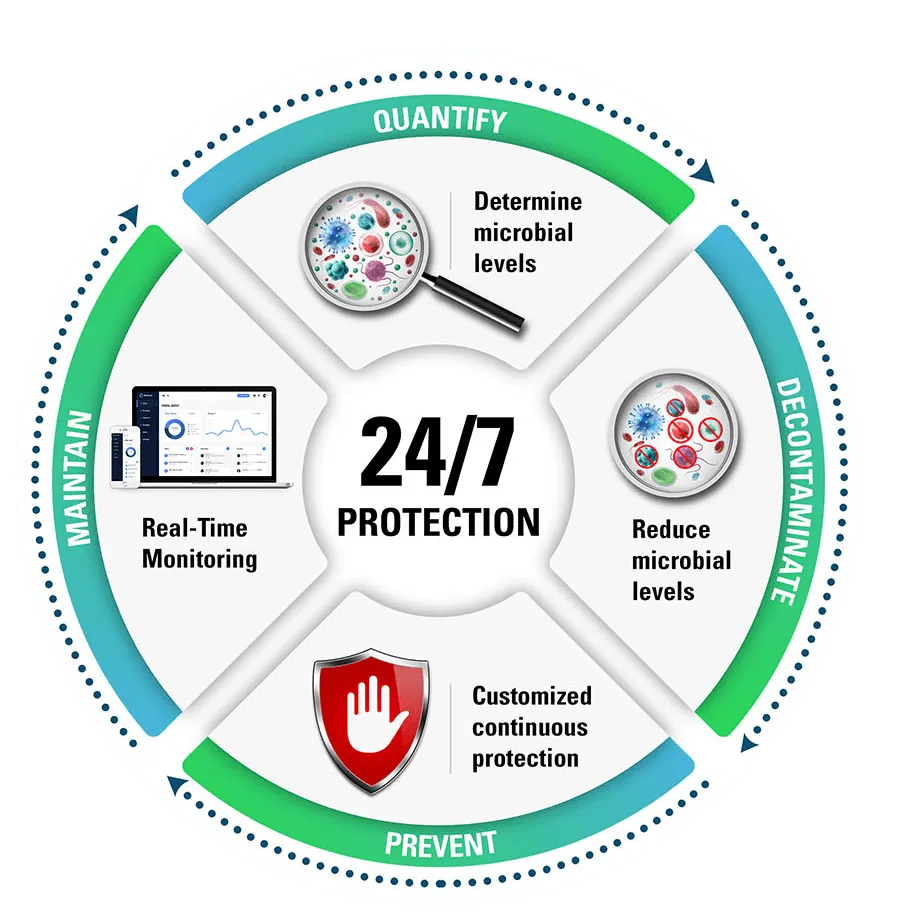Extreme Microbial Technologies
Committed To Making Indoor Spaces Healthier and Safer
What is Microbial Technology?
At Extreme Microbial Technologies (EMT), we specialize in supplying earth-friendly decontamination systems for various indoor settings, including but not limited to Education, Hospitality, Indoor Growing, Food Processing & Manufacturing, Healthcare, Commercial & Residential, Restaurant, and Retail

CHEMICAL FREE
Our solution is ideal for people, pets, plants and products

AIR & SURFACE PURIFICATION
Effectively combat the presence of viruses, bacteria, & mold in your indoor spaces

LONG TERM & SCALABLE
Easily designed and scaled to treat a wide range of facilities

ACTIVE
Our Energized Hydrogen Peroxide seeks out & attacks the problem at the source

CHEMICAL FREE
Our solution is ideal for people, pets, plants and products

AIR & SURFACE PURIFICATION
Effectively combat the presence of viruses, bacteria, & mold in your indoor spaces

LONG TERM & SCALABLE
Easily designed and scaled to treat a wide range of facilities

ACTIVE
Our Energized Hydrogen Peroxide seeks out & attacks the problem at the source
Always On. Always Protecting.
The EMT Difference
Discover how our systems can benefit your specific needs, and together, let's contribute to a healthier indoor world
Proven to Reduce up to 99.9% of Viruses and Bacteria
Both in the Air & On Surfaces
Our Air & Surface Purification Solutions target viruses, bacteria, and molds that invade all the indoor spaces we live and work in daily

Identify, Combat, Prevent & Maintain!
Who We Protect
PEOPLE DEPEND ON OUR TECHNOLOGY
Our Differences
Differentiation:
We pride ourselves on the distinct advantages that set our solutions apart in the world of air and surface purification
Energized Hydrogen Peroxide:
Our technology employs the power of the energized hydrogen peroxide molecules that are positively and negatively charged. Molecules actively seek out, neutralize, and eliminate harmful microbes. Ensuring a thorough purified environment
Always on, Always There:
Our systems are designed to be always active and prepared, offering continuous protection against pathogens. By providing a continuous defense, we ensure a consistently clean and safe indoor environment
No Chemicals in Products:
We prioritize the safety of all individuals, including humans, pets, plants, and products. Our purification systems utilize a chemical-free approach, ensuring a non-toxic, environmentally friendly solution that guarantees peace of mind
Monitor & Maintain
We provide real-time monitoring of both the environmental status and our unit’s operations. Additionally, we inspect all equipment on a regular basis and replace cells every 24 months
Our Differences
Testing:
Unlike our competitors, who test in boxes or hooded chambers, our solutions are 3rd party accredited and University tested in real-world spaces of up to 1,100 cubic ft.
Energized Hydrogen Peroxide:
Our technology uses the power of Energized Hydrogen Peroxide molecules to actively seek out, neutralized and eliminate harmful microbes. Ensuring a purified environment.
Always on, Always Protecting:
By providing a continuous defense, we ensure a consistently clean and safe indoor environment.
No Chemicals in Products:
We prioritize the safety of all people, pets, plants, and products. Our purification systems utilize a chemical-free approach, ensuring a non-toxic, environmentally friendly solution that guarantees peace of mind.
Monitor & Maintain:
We provide real-time monitoring of both the environmental status and our unit’s operations. Additionally, we inspect all equipment on a regular basis and replace cells every 24 months.
Highly Effective
99.90% SARS-CoV-2
Our technology has been tested to reduce up to a remarkable 99.90% of the SARS-CoV-2 virus, a testament to its efficiency of safeguarding against the COVID-19 disease.
99.47% H1N1
Our technology demonstrates exceptional efficiency by reducing the H1N1 virus by up to 99.47%. This helps us to contribute to a safer environment, especially during the flu season.
98.90% Penicillium
Our product effectively combats Penicillium, a health-hazardous mold. Our product is a vital tool in preserving a mold-free indoor space
99.99% Listeria
This level of protection is crucial in food processing and food storage facilities.
99.99% Staphylococcus
Our technology is highly effective against Staphylococcus (MRSA), a bacterium known for causing various infections.








Facebook